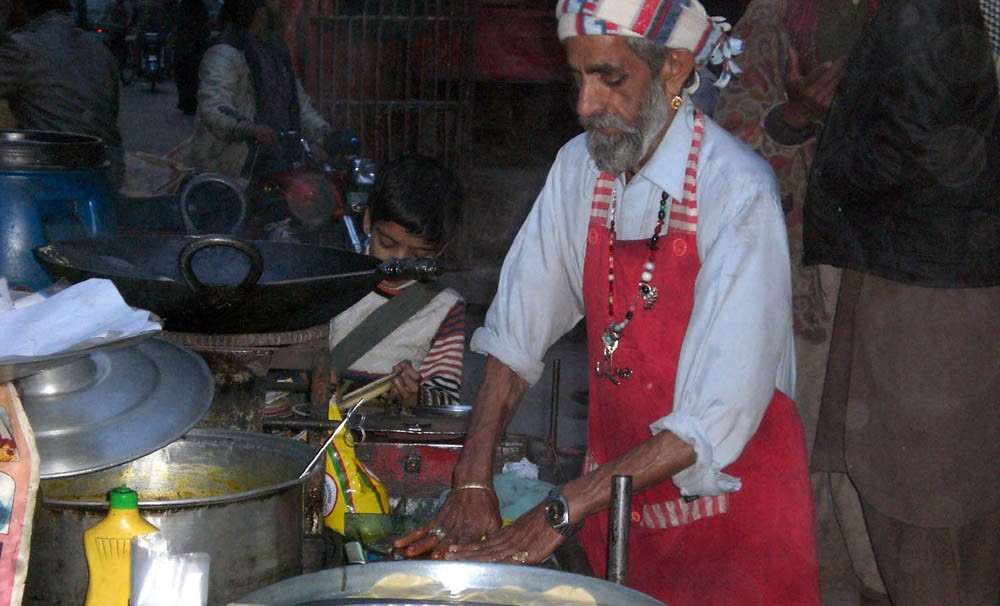
Monikered 'Jhoolay Laal', because of his inclination to Sufism, Mohammad Sajjad has long served the Lahoris with a savoury food item he carried over from his beloved home city in India

Fifty-five years old Mohammad Sajjad, or Jhoolay Laal, as he is commonly called, had never envisioned selling kachoris (a Purani Dilli variety of the delicacy) to Lahorites despite his undying love for the snack. It was during his third visit to India, having left the country for good with his family in the mid-1960s, that he came up with the idea of making a livelihood out of his childhood obsession.
"My decision to start a kachori business was motivated by my being out of work at the time and also the fact that I missed the taste of Sharif Bhai’s kachoris I was so fond of as a child," he says.
In Delhi, Laal learnt how to make kachoris from the one who introduced him to it. Sharif Bhai, whose shop near Turkman Gate is now managed by his sons and is still thronged by people of all faiths and tastes, especially vegetarians, willingly shared the recipe with him due to some association with his family.
"The only difference between Sharif Bhai’s kachoris and mine is that he made them with pigeon peas (ahrar ki daal) while I use Bengali gram (channay ki daal) because the former is not easily available in Lahore," he claims. "Our bhaji contains the same ingredients and it also tastes the same."
Laal had an amazing childhood in Mohalla Phatak Teliyan of Old Delhi where the "Hindus and Muslims lived in complete harmony with each other." But his father’s untimely death and his mother’s second marriage to a distant relative from Pakistan when he was only six brought the family to Sukkur. He spent a major part of his teens in the city working at his step father’s paan-cigarette shop.
When Laal’s mother visited India again after a few years, he accompanied her with his younger brother and an infant step brother. His father did not allow his mother to take two of his elder brothers along because "he feared she would not return."
In Old Delhi, Laal feasted on Sharif Bhai’s kachoris, reviving memories of the days when a wealthy relative used to distribute four ana coins among children so that they could buy their favourite snack.
Now 12, Laal was impressed by the respect her mother commanded among the locals irrespective of their different religious beliefs or sects. "What surprised me the most was that my mother shunned the burqa as soon as she left the Pakistani soil," he recalls.
A couple of years after his India visit, Laal’s mother passed away and his step father shifted initially to Karachi and later to Lahore.
A young Jhoolay Laal, having parted ways with his step father because of his abusive attitude, tried his hand at various vocations but without much success. Finally, he landed a job at a restaurant where he worked for over a decade until it was shut down, in the early 1990s. Laal was in his early thirties and had recently been married when the tragedy befell him. He spent the next few years trying to find a decent livelihood but in vain. Meanwhile, he made his second visit to India, accompanied by his wife and a young daughter, in the late ‘80s, to meet his father’s ailing brother. The alleys of Old Delhi where he had grown up beckoned him even more as he compared himself with his cousins who had stayed back in India and thrived.
Laal made his third and latest visit to India in the mid ‘90s, accompanied by his wife and four children. "The two visits made me extremely nostalgic and I envied the business opportunities available in India," he says.
On his return to Pakistan, he set up a kachori (though he markets it as ‘bhel puri’) stall in a downtown neighbourhood of Lahore. And, there has been no looking back.
Customers can be seen waiting before Laal sets up his stall at three different locations in Malik Park. "My customers include people of all ages and ethnicities but mostly children and Urdu-speaking people," he says.
Laal sells a kachori for Rs10 and it comes with free bhaji.
The locals are extremely fond of the afternoon snack and particularly like to serve it to their guests.
Laal’s reputation has been enhanced by his devotion to Sufism. "I was named Jhoolay Laal at the shrine of Hazrat Shahbaz Qalandar and since then no one has addressed me by my real name," he explains.
Aptly, he takes a break from business on Thursdays. Some of his customers complain that he goes missing for days whenever there is an urs of a saint in the city.
"Jhoolay Laal’s kachoris are a must at least once a week, especially if there are friends visiting us," says Malik Shafiq, a local businessman and a social worker.
A majority of his customers claim to be Laal regulars. "Whenever I come to Lahore, I look forward to eating kachoris from his stall," says Lala Meer, a resident of Azad Kashmir.
Sharing his recipe of kachoris, Jhoolay Laal says they are made with white flour, ghee, salt, chilli and Bengali gram paste. "The dough has to be kneaded for two-and-a-half hours before filling it with the paste. My wife takes care of this demanding part."
The bhaji, served with kachoris, is made with potatoes and a mixture of over a dozen spices that impart it a unique tangy flavour.
The kachoris are a treat unto themselves but equally impressive is Laal’s craving for peace between Pakistan and India. He blames the political leadership on both sides of the border for the prevailing tension and advocates a visa-free regime.
Laal has not only provided the Lahoris with a savoury food item from his beloved Purani Dilli, he has also won many a heart due to his humility.